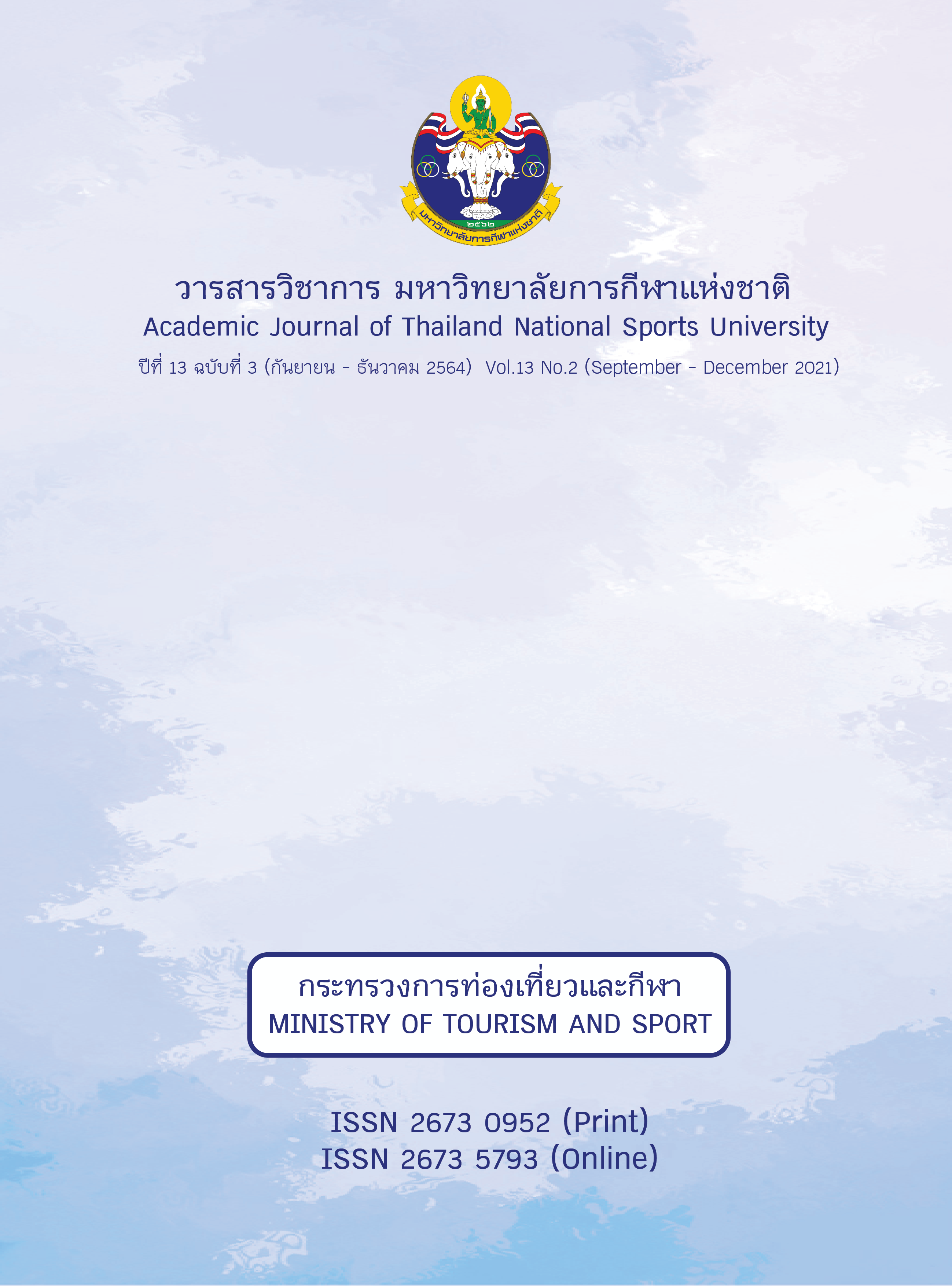ACUTE EFFECTS OF COLD WATER IMMERSION DURATIONS ON PERFORMANCE AND LACTATE RECOVERY IN 100 METER FRONT CRAWL SWIMMING
Main Article Content
Abstract
This research was a study of the recovery by immersing in cold water in different time duration together with siting at rest, which affected the time statistics, lactate content, and heart rate. The samples used in this research were 12 Thai swimmers, aged between 18 to 24 years old. The subjects were assigned to swim at maximum speed in 100 meter front crawl stroke. The recovery was performed in 3 ways: 20 minute rest (control group) and cold water immersion at a water temperature of 14 °C with 10-minute immersion then sit and rest for 10 minutes (experiment 1), 15-minute immersion then sit and rest for 5 minutes (experiment 2). The first test will perform experiment 1, the experiment was performed 48 hours apart (every other day). The amount of lactate content was collected from the fingertips and the heart rate measured at 3, 5, 10, 15, and 20 minutes. After that, the samples were assigned to swim with front crawl stroke at a distance of 100 meters with maximum speed again to record the swimming time statistics after the recovery. The collected data were analyzed by using F-test by setting statistical significance at .05. The results showed that when comparing the time statistics after the recovery of each experiment, there were no statistically significant differences, whereas in the average lactate content and average heart rate after the recovery of experiment 1 and 2 there was a lower average than that in the control group with statically significance difference (p < .50). In conclusion, the immersion of cold water immersion at a water temperature of 14 °C with 10-minute immersion then sit and rest for 10 minutes and 15-minute immersion then sit and rest for 5 minutes decreased the lactate content and heart rate resulting in faster recovery.
Article Details
The published article is a copyright of the Academic Journal of Thailand National Sports University. The passage appeared in each article in this academic journal is a perspective of each author which is not related to the journal. Each author is required to be responsible for all components of his/her own article. If there are any mistakes, each author must be responsible for those mistakes on his/her own.
References
Bleakley, C. M., and Davison, G. W. (2010). What is the biochemical and physiological rationale for using cold-water immersion in sports recovery? A systematic review. British Journal of Sports Medicine, 44(3), 179 – 87.
Blomkalns, Al. (2007). Lactate a marker for sepsis and trauma. Emergency Medicine Cardiac Research and Education Group, 2.
Bonde-Petersen, F.,Schultz-Pedersen, L., & Dragsted, N., (1992). Peripheral and central blood flow in man during cold, thermoneutral, and hot water immersion. Aviation, Space, and Environmental Medicine, 63(5), 346 - 350.
Chusak Vejbaesya and Kanya Palavivat. (1993). Physiology of Exercise. Bangkok: Thaiwattana panich.
Crowe, M. J., O’Connor, D., and Rudd, D. (2006). Cold water recovery reduces anaerobic performance. Sport Medicine, 28, 994 - 998.
Foss, M.L. and Keteyian S.J. (1998). Fox’s Physiological Basic for Exercise and Sport (6th ed.). The McGraw-Hill Companies, Michigan.
Herman. (2007). Physics of Human Body. New York: Springer Berlin Heidelberg.
Ian, M. W., Cronin, J., B., & Wayne, A. (2006). Physiological response to water immersion: A method for sport recovery?. Sports Medicine, 36(9), 747 - 765.
Ihsan, M., Watson, G., and Abbiss, C. R. (2016). What are the physiological mechanisms for post-exercise cold water immersion in the recovery from prolonged endurance and intermittent exercise? Sports Med, 46, 1095 – 1109.
Kjendlie, P., and Pedersen, T. (2006). The effect of the breathing action on velocity in front crawl sprinting. Portuguese Journal of Sport Sciences, 6(2), Porto, 75 - 77.
Machado, A. (2015). Can water temperature and immersion time influence the effect of cold. Sports Medicine. 48, 1369 – 1387.
Marsh, D., and Sleivirt, G. (1999). Effect of precooling on high intensity cycling performance. British Journal of Sports Medicine, 33(6).
Parouty, J., Haddad, H. A., Quod, M., Leprêtre, P. M., Ahmaidi, S., & Buchheit, M. (2010). Effect of cold water immersion on 100-m sprint performance in well-trained swimmers. European Journal of Applied Physiology, 109, 483 – 490.
Peiffer, J.J., Abbiss, C.R., Wall. B.A., Watson. G., Nosaka. K., Laursen. P.B. (2008). Effect of a 5 min cold water immersion recovery on exercise performance in the heat. British Journal of Sports Medicine, 6.
Peiffer. J.J., Abbiss. C.R., Watson. G., Nosaka. K., & Laursen. P.B. (2010) Effect of cold water immersion on repeated 1 - Km cycling performance in the heat. The Journal of Science and Medicine in Sport, 13, 112 – 116.
Schniepp J., Campbell T.S., Powell K.L., & Pincivero D.M. (2002). The effects of cold - water immersion on power output and heart rate in elite cyclists. J Strength Cond Res, 16, 561 – 566.
Soultanakis H.N., Nafpaktiitou D., S.M. Mandaloufa (2015). Impact of cool and warm water immersion on 50-m sprint performance and lactate recovery in swimmers. The Journal of Sports Medicine and Physical Fitness, 55, 267 – 272.
Thanavit Thosakul, & Weerawat Limmroongreungrat. (2014). Basic Applied Sports Science for Training Swimmer. Veerawan Printing & Packaging.
Thailand Swimming Association. (2017-2021). Fina swimming rules. (2017 – 2021). FINA Swimming Rules Book. P. 9.
Wilcock, I. (2006). The effect of water immersion, active recovery and passive recovery on repeated bouts of explosive exercise and blood plasma (Master’s thesis), Auckland University of Technology.
Yeargin, S.W. et al. (2006). Body cooling between two bouts of exercise in the heat enhances subsequent performance. The Journal of Strength and Conditioning Research, 20, 383 – 389.


